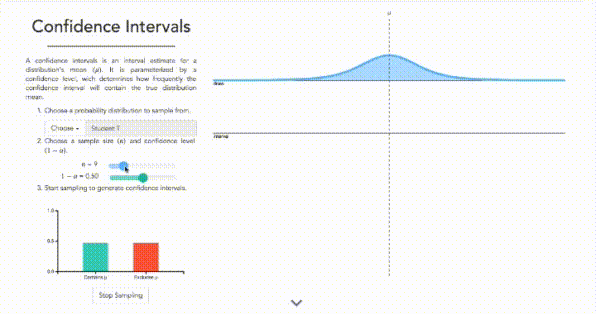Guest post by Jeff Mosenkis of Innovations for Poverty Action.
Greetings from IPA & J-PAL’s global staff training in Kenya. It’s where new staff from all over who’ll be collecting and analyzing the data that goes into dev econ papers come for a week. They learn advanced STATA commands, sampling methodology, and good data publication practices – it’s the summer camp that band camp makes fun of. The best training session was probably the one with tips on how to communicate with economists.
- A Brown University student created a visual guide to statistics, with interactive explanations of basic concepts like confidence intervals (above). You can change parameters like sample size and see how it would affect results over multiple draws.
- A number of contributors summarize a lot of new research from the Centre for the Study of African Economics conference. They’re helpfully condensed into single sentences, broken down by topic and tagged by methodology.
- And David Evans summarizes 35+ education(ish) papers he’s read over the past few months in usual pithy fashion.
- An Africa trade and economics summit in Los Angeles had no Africans this year. All of the participants from African countries were denied visas. (h/t Faith McCollister)
- When poor countries have a natural resource, it can often end up hurting the general population. The benefits accrue to the few in control and the political and economic conflict around securing that control can end up hurting the general public, a phenomenon known as the resource curse. A new paper concludes that the resource curse can happen even without the actual resource. In São Tomé e Principe, off the coast of West Africa, there was an expected oil boom in the late 1990s, while Madagascar had expectations of a sapphire discovery in the late 1990s followed by oil in the 2000s. Contracts were signed with outside companies, and even though the resources never materialized, the political upheaval associated with resource curses did. (h/t This Week in Africa)
- A prominent Cornell behavior and food lab, known for headline-grabbing research on clever nudges for healthier eating, is coming under scrutiny. A student in the Netherlands reviewed papers from the lab and discovered 150 cases of impossible statistical findings or other inconsistencies. The researcher has refused to share the data behind the studies.
But that’s nothing compared to PizzaChartGate. Remember never to annoy the data viz community.
It's unbelievably difficult to screw up a pie chart about pizza but here we are https://t.co/qWgz1pA34I
— Christopher Ingraham (@_cingraham) March 6, 2017


8 Responses
pretty interesting article loved your writing style
i ask you to check my blog on blackmart app which is a preimum apps providing black market store
May I simply say what a comfort to uncover somebody who genuinely understands what they are discussing over the internet. You definitely realize how to bring a problem to light and make it important. More people ought to look at this and understand this side of the story. I was surprised you’re not more popular given that you most certainly possess the gift.
Oh my goodness! Impressive article dude! Thanks, However I am going through troubles with your RSS. I don’t understand why I can’t join it. Is there anybody getting the same RSS problems? Anyone that knows the solution can you kindly respond? Thanx!!
A number of contributors summarize a lot of new research from the Centre for the Study of African Economics conference. They’re helpfully condensed into single sentences, broken down by topic and tagged by methodology.
golu dolls
golu dolls
I found your post so interesting.
grate post all time
It is a great article. You will surely like this also because it is a great stuff, yeah it’s give us lots of interest and pleasure.
Great post Jeff. Thanks for sharing.